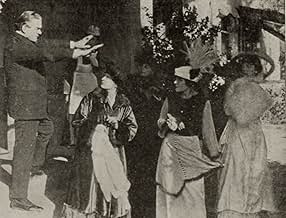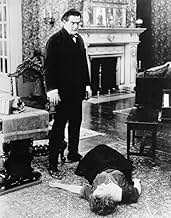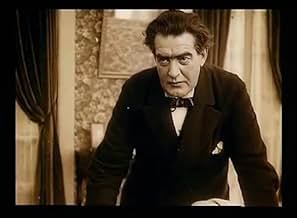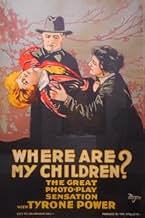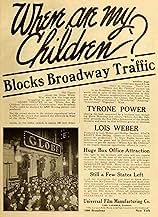A District Attorney's outspoken stand on abortion lands him in trouble with the local community.A District Attorney's outspoken stand on abortion lands him in trouble with the local community.A District Attorney's outspoken stand on abortion lands him in trouble with the local community.
- Awards
- 1 win total
Tyrone Power Sr.
- District Attorney Richard Walton
- (as Mr. Tyrone Power)
Mrs. Tyrone Power
- Mrs. Richard Walton
- (as Helen Riaume)
Alva D. Blake
- Roger - Mrs. Walton's Brother
- (as A.D. Blake)
George Berrell
- Judge
- (uncredited)
Georgia French
- Child
- (uncredited)
Mary MacLaren
- Walton's Maid
- (uncredited)
Andy MacLennan
- Man on Street
- (uncredited)
Anne Power
- Infant
- (uncredited)
Storyline
Did you know
- TriviaThe two children of Tyrone Power Sr. and his co-star and real-life wife Helen Reaume (aka, Mrs. Tyrone Power), appear in this film: their newborn daughter Anne Power and their two-year-old son Tyrone Power, who became a matinee idol from the 1930s to the 1950s. He appears in the last minute and a half of the movie as a "ghost child".
- Quotes
Opening Title Card I: The question of birth control is now being generally discussed. All intelligent people know that birth control is a subject of serious public interest. Newspapers, magazines and books have treated different phases of this question. Can a subject thus dealt with on the printed page be denied careful dramatization on the motion picture screen? The Universal Film Mfg. Company believes not.
- Alternate versionsIn 2000, the Library of Congress Motion Picture Conservation Center copyrighted a preservation print reconstructed from several incomplete prints. Funded by the Women's Film Preservation Fund of New York Women in Film and Television, it was coordinated by Scott Simmon, has a piano score composed and performed by Martin Marks, and runs 62 minutes.
- ConnectionsEdited into Governing Body (2023)
Featured review
Quite apart from being one of the few chances to see a Tyrone Power film (father, not son); this Lois Weber film is a powerful anti-abortion piece - albeit one which is clogged with concerns around birth control and what looks to be misguided focus on the process of eugenics (i.e. determining strong genes and background before having children).
DA Richard Walton has always wanted children and cannot understand why his wife (played by the real-life Mrs Power, Helen Riaume) fails to conceive. Of course as we quickly find out, she has sent many unwanted children back to the portal of heaven where they wait to be called, by having numerous abortions and arranging for her friends to do the same, including the lazy social butterfly Mrs Carlo (Marie Walcamp).
There are three plot strands here - one concerning a progressive doctor (C Norman Hammond) who wishes to teach the poor about birth control and who is being prosecuted for obscenity; one concerning a virginal housemaid's daughter (Rena Rogers) who is seduced by Mr Walton's brother-in-law (William J Hope), with tragic consequences; and one about the trips to the abortion clinic of Dr Malfit (Juan de la Cruz) which are commonplace to Mrs Walton and her set.
Intercut with these stories are sights of the children waiting to be called into the womb - the unwanted as well as the wanted. This is perhaps the most artificial part of the film as the gates of heaven open and close to allow children to be called to earth or to return again to the portal of the unwanted. It works but looks rather old fashioned these days.
The ending is very moving, however, as Mr and Mrs Walton, knowing she is now unable to have children, are surrounded by the ghosts of their unborn as they descend into old age.
A preachy film but a powerful one. Amazing to think that items tackled here, over 90 years ago, could not be touched on again until the second half of the twentieth century.
DA Richard Walton has always wanted children and cannot understand why his wife (played by the real-life Mrs Power, Helen Riaume) fails to conceive. Of course as we quickly find out, she has sent many unwanted children back to the portal of heaven where they wait to be called, by having numerous abortions and arranging for her friends to do the same, including the lazy social butterfly Mrs Carlo (Marie Walcamp).
There are three plot strands here - one concerning a progressive doctor (C Norman Hammond) who wishes to teach the poor about birth control and who is being prosecuted for obscenity; one concerning a virginal housemaid's daughter (Rena Rogers) who is seduced by Mr Walton's brother-in-law (William J Hope), with tragic consequences; and one about the trips to the abortion clinic of Dr Malfit (Juan de la Cruz) which are commonplace to Mrs Walton and her set.
Intercut with these stories are sights of the children waiting to be called into the womb - the unwanted as well as the wanted. This is perhaps the most artificial part of the film as the gates of heaven open and close to allow children to be called to earth or to return again to the portal of the unwanted. It works but looks rather old fashioned these days.
The ending is very moving, however, as Mr and Mrs Walton, knowing she is now unable to have children, are surrounded by the ghosts of their unborn as they descend into old age.
A preachy film but a powerful one. Amazing to think that items tackled here, over 90 years ago, could not be touched on again until the second half of the twentieth century.
Details
- Release date
- Country of origin
- Languages
- Also known as
- The Illborn
- Filming locations
- Production companies
- See more company credits at IMDbPro
- Runtime1 hour 2 minutes
- Sound mix
- Aspect ratio
- 1.33 : 1
Contribute to this page
Suggest an edit or add missing content

Top Gap
By what name was Where Are My Children? (1916) officially released in Canada in English?
Answer
